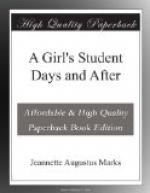A fourth tool for the girl in her study—one that cannot be deliberately acquired, as information or apparatus or even health can be—is Experience. This is the most valuable tool of all—one’s experience of travel, with people, in responsibility, in love, in joy, in sorrow, in any kind of work. The girls who are the most interesting in the classroom are the girls who are not contenting themselves with apparatus alone but whose minds are flexible with experience, who bring all of themselves, their life, to bear upon the work. A certain well-known minister had prepared a sermon for his usual Sunday engagement, but half an hour before service another text came into his mind. He could not forget it, so he jotted down notes and preached the new sermon instead of the one that had been prepared. This sermon made a great impression on all who heard it, and the minister himself said of it that some people would declare that it had been thought out in half an hour, but that really he had put fifty years of his life into it. The sharper and better the tools, the finer the character of the work. If experience has been observed and retained, and previously acquired knowledge is ready for service, and hand and mind know how to use books, and the student is in good condition physically, then the excellence of that girl’s work in the class and out can be guaranteed.
And now what are the uses of the work which these tools can accomplish for us? Coleridge wrote in his poem, “Work Without Hope,”
“Work without Hope draws
nectar in a sieve,
And Hope without an object
cannot live.”
The only hope that can last is hope that is not wholly centred in ourselves, but has some thought for others and our service to them. Work devoid of inspiration and ideals, work done merely for one’s self, study pursued with only a degree as an end or for the sake of “pay” as a teacher, turns school and college into a market-place, a place of barter, where in exchange for so much energy and so much money we may acquire a certain position and livelihood. Only that work in which one has the consciousness of being, or becoming, useful to others, brings joy that will endure. What do we think of the minister who is without a sense of consecration? The responsibility of the student or the teacher is quite as large, the opportunity for service quite as wonderful. One of our greatest English poets, William Wordsworth, exclaimed: “I wish to be considered as a teacher, or as nothing!” The calling of the teacher, of the student, has through all time been thought a high one,—one that has drawn to itself fine and unselfish spirits. The life of the student, no matter how necessary to the world its market-places are, never has been and never can be a life of barter, of trade.




